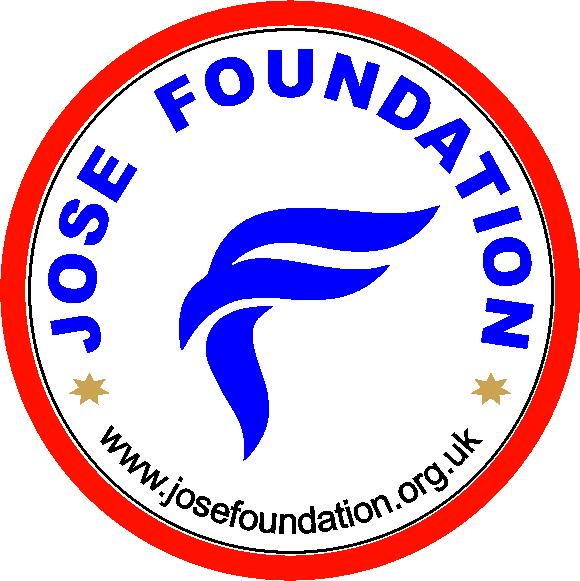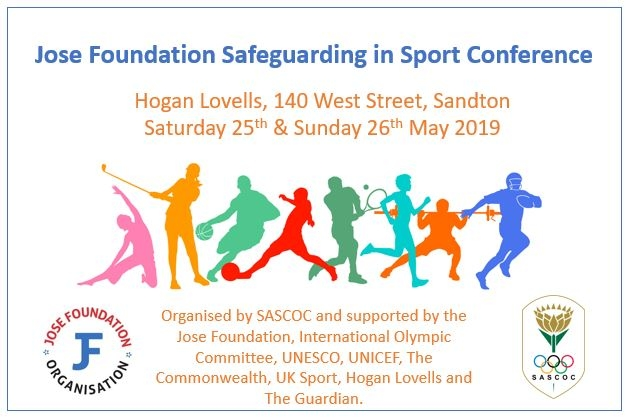Dr Prince Martins Abhulimhen, President of the Jose Foundation, has welcomed pledges made by a number of sports bodies to action policies and measures to safeguard children and adults from harassment and abuse following the Jose Foundation Safeguarding in Sport Conference held in Sandton, Johannesburg, South Africa on the 25th and 26th May 2019.
Dr Prince Martins Abhulimhenstated: “The Jose Foundation believes we need to act to safeguard children and vulnerable adults from all forms of non-accidental harm in Africa, including sexual harassment and abuse, whatever setting it is taking place including sport. All who participate in sport should be able to do so in a safe environment that is free from harm. We welcome the commitment of sports organisations attending the conference in answering positively the call to action to safeguard participants in sport in Africa.”
The Jose Foundation Safeguarding in Sport Conference was aimed at board members, senior managers and staff of National and Regional Sports Organisations who are in a position to champion the adoption of safeguarding policies and measures in sorts organisations and to help change culture in sport that creates environments that enable non-accidental harm to take place.
The conference was sponsored by the Jose Foundation, Hogan Lovells and Guardian Child Protection Services. Organised in partnership with SASCOC, under the patronage of UNESCO and with support from UNICEF, the IOC, IPC, The Commonwealth, Commonwealth Games Federation, Safe Sport International, UK Sport, Norwegian Olympic Committee and LimeCulture.
The conference was attended by speakers and delegates from Botswana, Kenya, Lesotho, Namibia, Nigeria, South Africa, Switzerland, Trinidad & Tobago, United Kingdom and Zambia. Olympic Committees, Government Departments, National Sports Organisations and Sport for Development organisations were represented at the conference.
The conference opened with macro-sport organisations, the IOC, IPC, Commonwealth Games Federation, The Commonwealth and Safe Sport International setting out their positions on the safeguarding of children and adults from harassment and abuse in sport. This was followed by insight from a panel of speakers on how International Sports Federations are moving to make safeguarding a priority for their events and member Federations.
Over the course of the conference legal experts addressed sport’s legal duty of care in law to protect participants from harassment and abuse, the vetting and reporting of cases of harassment and abuse in sport and the need for sports organisations to have in place independent case management and disciplinary procedures. Speakers also reviewed the position of Safeguarding in South Africa and heard examples of efforts to implement safeguarding in other African countries and international sporting events held in Africa.
Recognising that sport can help protect vulnerable children and adult and provide them with safe spaces they can go to, the conference heard from speakers who use sport as a means of supporting and developing young people from disadvantaged backgrounds.
The conference heard powerful testimony from a survivor of child sexual abuse at the hands of her sports coach, Bob Hewitt, a tennis coach who sentenced in 2015 to six years in prison for the rape of two young women and sexual assaulting another who he coached in the 1980s and 1990s and from a parent of children who were victims of child sexual abuse by their sports coach, Collan Rex, a former Parktown Boys’ High School water polo coach who was sentenced in 2018 to 23 years in prison on 144 counts of sexual assault and 14 of assault. Their stories were difficult to tell and to listen to, but important in allowing the delegates to understand how predators use their position in sport to access, groom and harm children. No delegate could have listened to their moving stories and not have grasped the need to change cultures in sport and implement safeguarding policies and measures.
Norman Brook, Conference Organiser stated: “We are indebted to the speakers who attended the conference to share their harrowing experience of sexual harassment and abuse that they suffered at the hands of predatory sports coaches. Their testimony highlighted how the sporting environment and culture was used to enable this harm and that sport must act to change culture and put in place measures to safeguard children and vulnerable adults from harm. Sport should provide children and vulnerable adults with a space where they safe and free from any harassment or abuse.”
On the second day of the conference, speakers shared their experience of implementing safeguarding in sport in the Caribbean and Europe highlighting practical issues and potential pitfalls for sports organisations. Delegates then broke out into small groups to identify key take away points from the conference and future actions. The conference delegates also affirmed the Johannesburg Declaration on Safeguarding against Harassment and Abuse in Physical Education, Sport and Recreation.
MOST IMPORTANT TAKE-AWAY POINTS FROM THE CONFERENCE
As identified by conference delegates the most important take away points from the conference were:
- Urgency of getting legislation and policy on safeguarding against harassment and abuse in sport addressed from top down.
- Move from policy to action in implementing safeguarding at all levels and all stakeholders.
- There is a lack of communication on this subject. Awareness campaign in SA about safeguarding against harassment and abuse in sport is necessary and everybody’s responsibility.
- Safeguarding against harassment and abuse in sport is not just for coaches and athletes. It is about all stakeholders and role-players.
- We have the responsibility and accountability to implement and embed safeguarding in everything we do. “Let us be the change we want to see”.
- Safeguarding against harassment and abuse in sport should be a module in all sport, recreation and physical education capacity building programmes. Develop accredited and non-accredited training programmes that are age appropriate.
- We must be proactive and not reactive. We cannot wait for an incident and then only face the problem. Set up systems to deal with the problem and train everybody involved at all levels.
- Engage other National/Provincial Departments for resources they may have on the subject.
- Disseminate safeguarding information to school sport organisations that should have safeguarding leaders that are trained and audited.
- SRSA and SASCOC should make safeguarding against harassment and abuse in sport a requirement for funding assistance requested.
- We need champions and models. Safeguarding is everyone’s business.
- Promote a culture of child-centredness and athlete-centredness. Safeguarding must become part of the culture of sport in South Africa and Africa.
- All conference delegates to continually implement the action points discussed at the conference. We are committed to eradicate the problem from sport, recreation and physical education.
- SASCOC must ensure that USSA and Department of higher Education buy-in to the process and system of safeguarding against harassment and abuse in sport.
- We must establish and work with partnerships as no one organisation can achieve our goals of safeguarding alone.
- Share the information and best practices from other international partners such as the Commonwealth Games Association, IOC, UK Sport, and visiting countries such as the Caribbean.
- Include the topic of safeguarding in all meetings/training sessions with parents of participants.
- Encourage exchange programme on safeguarding matters with our international partners.
- There must be a commitment to safeguarding against harassment and abuse in sport from the leadership of National sport bodies down to Provincial and Local bodies.
MOST IMPORTANT ACTION POINTS
As identified by conference delegates the most important action points from the conference were:
- SASCOC to develop a framework policy document, and a toolkit including requirements for affiliated member constitutions to be amended to include safeguarding.
- SASCOC to develop and provide a safeguarding training programme to National Federations.
- Establish an independent body to manage cases of harassment and abuse in sport.
- Establish a central register of offenders for sport that can be used by any organisation to do their due diligence and reference and clearance checks before recruiting.
- SASCOC and each National Federation to appoint a Safeguarding Officer.
- All National Federations and SASCOC must establish a safe-space or system for reporting of incidents of abuse and harassment in sport. There must be an avenue for the prevention and early intervention of incidents of harassment and abuse.
- SASCOC should arrange a follow up conference where it is compulsory for ALL National Federations to attend.
- SASCOC should set tangible deadlines and a programme for implementation of policy and programme on safeguarding against harassment and abuse in sport.
- SASCOC should conduct a thorough audit on safeguarding against harassment and abuse in sport in all relevant sectors at all levels covering a wide range of indicators.
- SASCOC to lobby for a change in legislation to ensure sport coaches/instructors are treated the same as educators in respect of sexual relationships with those in their care.
- SASCOC to strengthen synergies between different entities/role players e.g. Law enforcement agencies such as SAPS, Justice Department, and Department of Basic Education, SRSA to follow up on actions.
- All sport bodies doing recruitment must immediately do vetting and clearance checks of potential employees/volunteers against the Child Protection Register and the Sexual Offences Register.

